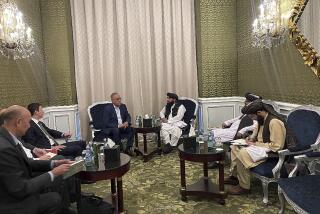Afghans Take Turns at Venting
- Share via
KABUL, Afghanistan — Eager to vent their views after two days of perceived deal-making behind their backs, delegates to Afghanistan’s freewheeling grand assembly took to the floor Wednesday with passionate debate, an ode to warlords, a scuffle with peacekeepers and veiled threats that renewed civil war is looming.
This ravaged nation’s first grappling with democracy in decades was rowdy enough to make the uninitiated mindful of the adage that no one wants to watch laws or sausages in the making.
But by local standards, the first full day of the weeklong gathering to choose national leaders stimulated vibrant and overdue discussion of all that ails Afghanistan. The delegates’ unbridled enthusiasm portended a more raucous and unpredictable exchange than seemed likely earlier this week, when foreign diplomats and Afghans holding interim power were scripting the session before it opened.
Delegates seized on their chance to pontificate with gusto, arguing early into this morning.
The marathon talks ostensibly focused on choosing a conference chairman. The selection was a formality, but it didn’t seem so as delegates channeled pent-up energy into the decision at hand after their chief task--electing a head of state--was essentially taken from them. Interim Prime Minister Hamid Karzai is expected to be named transitional president without serious challenge before the end of the week.
After an overnight session, the delegates selected as conference chairman Ismail Qasimyar, the chief of the organizing committee of the loya jirga, or grand assembly, despite his perceived collaboration with the Karzai Cabinet and Western diplomats to ensure that the interim prime minister is chosen as leader.
Mohammad Zaher Shah, the nation’s former monarch, withdrew his candidacy for head of state Monday under U.S. pressure. Former President Burhanuddin Rabbani did likewise Tuesday, leaving the field largely clear for Karzai. The 44-year-old ethnic Pushtun interim leader is widely respected, but delegates have been chafing under the impression that their role has been hijacked by secret wheeling and dealing.
Still, the enthusiasm for discussion was feverish, if not always refined. Turbaned elders, sartorial emigres and newly empowered women lined up by the dozens to make their points, often to lambaste organizers for giving gunmen who destroyed Afghanistan during 23 years of war a place at their forum.
“We were told the loya jirga would be off-limits to those with blood on their hands, yet we see these people everywhere,” charged Safar Mohammed, an elderly delegate. “There are so many men with guns here that I don’t know if I’m at a loya jirga or a military convention.”
The warlords’ residual power was apparent in a clash between one delegate’s bodyguards and German peacekeepers early Wednesday. When troops of the International Security Assistance Force stopped two truckloads of gunmen headed for the loya jirga site, four of the Afghans drew weapons, inciting a scuffle that ended with the bodyguards being handed over to local police.
The gunmen were escorting Afghanistan’s ambassador to Britain, Ahmad Wali Masoud, brother of the late warrior Ahmed Shah Masoud, who was assassinated by Al Qaeda agents two days before the Sept. 11 attacks.
Masoud told journalists Wednesday that the scuffle outside the assembly site was “a very small misunderstanding that was cleared up quickly.”
Armed undercover agents of the National Security Directorate, a state intelligence force under the control of the late Masoud’s fellow commanders in the Northern Alliance, also have been stalking the giant tent where the delegates are gathering.
Afghans’ notorious reflex to reach for the gun was apparent in the not-so-subtle warnings of warlord Abdul Rasul Sayyaf, who said he was dismayed to hear his fellow delegates speaking ill of the moujahedeen fighters who had helped liberate them from Soviet occupation and the Taliban regime.
“I say to my friends here who are insulting the gunmen that we owe our peace and freedom to the army,” he said in a fiery warning.
Because Sayyaf still controls one of the more menacing armed factions accused of human rights abuses against ethnic rivals, his defense of the past bloodletting was taken by many as a threat of reprisal.
Some foreign observers watched the displays of military muscle with more wonder than dismay. “I was amazed to see in the first and second rows those so-called warlords sitting together,” European Union envoy Klaus-Peter Klaiber told a news conference. “It tells me one thing: The interim administration has decided to try to integrate former warlords into policymaking in Kabul. If they succeed, that will be an achievement.”
The spirited debate reflected Afghans’ hunger for stability and acceptance in the wider world. So eager were the delegates to do their part in ushering in a new era that, at one point, more than 30 candidates were vying to chair the conference. They also spurned breaks suggested by the temporary chairman, Qasimyar, especially as he came under fire for using the podium to further his candidacy to run the show.
“What are you thinking about in considering this inefficient old man as chairman? He should be retired,” said Hashmat Ghani, accusing Qasimyar of selling out the loya jirga to foreign interests.
Karzai’s chief advisor, though, dismissed characterizations of the debate as clashes spurred by foreign intrusions--first and foremost by the U.S.--into the Afghan search for a political future.
More to Read
Sign up for Essential California
The most important California stories and recommendations in your inbox every morning.
You may occasionally receive promotional content from the Los Angeles Times.














